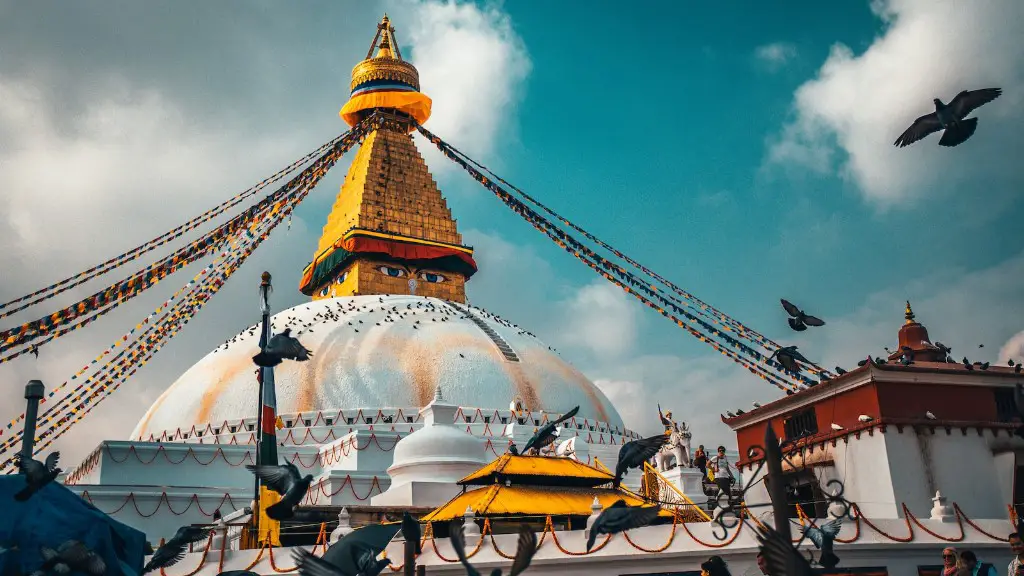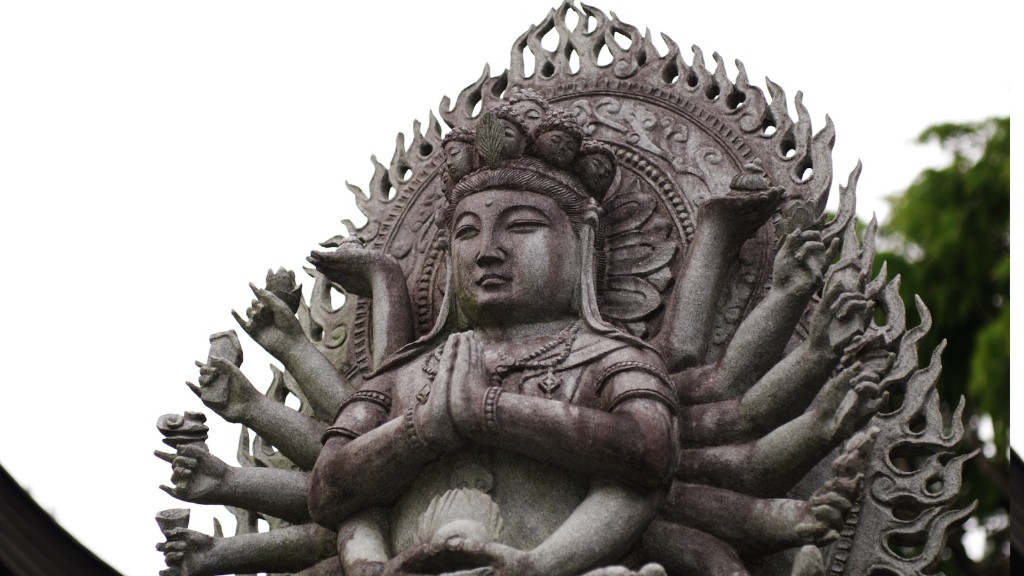Buddhism and Hinduism are two of the world’s oldest religions and have many similarities and differences. Both religions have a long and rich history, with Buddhism dating back to the sixth century BCE and Hinduism to the eleventh century BCE. While both religions share a common origin, their beliefs have evolved significantly over time into distinct philosophies.
The most fundamental differences between Buddhism and Hinduism concern the concept of God. Hindus believe in the existence of a single, all-powerful God, while the Buddha viewed the universe as an ever-changing network of energy and matter that forms the basis of all existence. Buddhism is non-theistic, meaning that it does not require a belief in God to appreciate the truths of its teachings.
The path to enlightenment is also a major area of distinction between the two religions. Hindus believe in the cycle of rebirth, known as samsara, in which one’s soul is reborn in a different form after death. Buddhists, however, practice the Four Noble Truths and the Eightfold Path, which are the core teachings of “right understanding,” “right thinking,” “right speech,” “right action,” “right livelihood,” “right effort,” “right mindfulness,” and “right concentration.” Following the Eightfold Path is crucial to achieving enlightenment in Buddhism, while in Hinduism there are many paths that one can take toward achieving moksha, a liberation from the cycle of rebirth.
In terms of rituals and worship, both religions involve the worship of deities, but the approach to such worship is distinct. In Hinduism, the worship of deities is essential in the process of becoming liberated from the cycle of rebirth and achieving moksha. Buddhism, on the other hand, places more emphasis on the individual’s spiritual development and meditation practice. While Hindus may engage in daily rituals, such as offerings to the gods, and larger festivals, Buddhists typically participate in meditation and mindfulness exercises.
It is evident that although there are several similarities between Buddhism and Hinduism, there are also some core differences. These differences define the uniquely distinct characteristics of each religion. From the concept of God to the path to enlightenment, Buddhism and Hinduism present two distinct approaches to life and spirituality.
Buddhist and Hindu Scriptures
Another way Buddhism and Hinduism differ is in the scriptures each religion follows. Hinduism is rooted in the Vedas – the oldest writings of the ancient Hindu culture. The Vedas consist of four collections of literature, including hymns, mantras, and rituals, which are believed to date back over 4000 years. Hindus also follow the Mahabharat and the Bhagavad Gita containing stories, advice, and teachings.
Buddhism has a rich and extensive collection of scriptures, the most influential of these being the Tripitaka, which is composed of the three “baskets” of Buddhist teachings: the Vinaya Pitaka (Code of Discipline), the Sutra Pitaka (Discourses), and the Abhidhama Pitaka (Commentarial Interpretations). The Tripitaka also includes teachings from famous Buddhist masters, such as the Dalai Lama, as well as teachings from the Buddha himself, outlining the Four Noble Truths and the Eightfold Path.
The scriptures of both religions provide adherents with a valuable source of wisdom and guidance. While the scriptures of both Buddhism and Hinduism provide spiritual growth and insights, the content of each religion’s scriptures is distinctly different. The Vedas, Mahabharat, and Bhagavad Gita offer advice, and stories to guide Hindus in their journey towards moksha, while the Tripitaka provides guidance for Buddhists in their practice of achieving enlightenment.
Meditation Practices and Practices
When it comes to meditation, Hinduism and Buddhism have similar practices but with unique differences. Both Hinduism and Buddhism involve a practice of silent meditation for calming the mind and exploring inner awareness. However, each religion approaches this practice differently.
In Hinduism, meditation is often focused on the repetition of mantras and reflecting on the power of mantras in connecting with a venerated deity. Hindus will often practice meditating in the presence of a deity’s idol or a statue, potentially on a daily basis. In Buddhism, meditation is usually done without the presence of religious symbols. It is often focused on the contemplation of ideas or life principles outlined in the Tripitaka and on allowing thoughts to arise and pass without judgment.
In both Hinduism and Buddhism, prayer is an important part of spiritual practice. Hindus will often pray to their deities in order to gain guidance and support, while Buddhists tend to focus meditation on silent contemplation and may incorporate prayers and mantras as part of their practice.
Both religions also involve a variety of other practices and rituals. Hindus practice a range of rituals related to specific deities, ancestors, and important life events. Buddhists engage in mindfulness practices such as walking and eating meditations, as well as more traditional practices such as chanting and prostrations. However, Buddhism places less emphasis on the importance of ritual and more on the individual’s spiritual development and mastery of the Four Noble Truths and the Eightfold Path.
Buddhism and Hinduism in The Modern World
Despite the many differences between Hinduism and Buddhism, both religions have influenced and continues to influence modern culture and society. From meditation to vegetarianism, Hinduism and Buddhism have had a profound impact on our culture and spiritual practices. Many modern approaches to stress relief, including yoga and mindfulness, are based on ancient Hindu and Buddhist teachings. Additionally, the concepts of karma and reincarnation have become increasingly popular in modern culture.
Moreover, compared to other world religions, Buddhism and Hinduism are both remarkably tolerant and accepting of diversity – something that has been embraced by adherents of both faiths. Despite their differences, Hindus and Buddhists can coexist and share in their spiritual and philosophical beliefs. This sense of tolerance and acceptance has enabled both religions to become an integral part of contemporary global culture.
Today, Hinduism and Buddhism are two of the world’s most practiced religions, each with its own rich history and core tenets. While both faiths share a common origin, their beliefs and spiritual practices have evolved differently over time, forming distinct and unique philosophies. When it comes to understanding the differences between Buddhism and Hinduism, it is important to remember that, despite their differences, the two religions can exist peacefully and even complement each other.
Differences In Rituals
When it comes to rituals and observances, there are several distinct differences between Buddhism and Hinduism. In Hinduism, rituals are an essential part of spiritual practice, and can range from offerings to the gods, to elaborate ceremonies, festivals, and vows. In Buddhism, on the other hand, ritual observances are seen as less important than the spiritual practice of meditation and mindfulness.
Furthermore, the rituals and practices of Hindus and Buddhists are of a different nature. Hindus often connect to the divine through daily and seasonal offerings, as well as through elaborate festivals and ceremonies, while Buddhists relate to the divine through meditation and mindfulness practice, such as walking meditations and mindful eating.
In addition, each religion has a unique approach to the worship of deities. Hindus engage in rituals to propitiate and worship the gods, while Buddhists tend to view the gods as symbolic representations of cosmic forces. Finally, Buddhism places emphasis on the individual’s journey to enlightenment, while in Hinduism the individual is usually seen as part of a larger cosmic cycle.
Festivals & Holidays
Hinduism and Buddhism also have distinct festivals and holidays. Hinduism has a wide range of festivals, typically related to specific deities, days of the week, or the lunar calendar. Among the most common festivals in Hinduism are Diwali, the festival of lights, and Dussehra, the celebration of Rama’s victory over Ravana. Buddhism has its own calendar of holidays and festivals, such as the Siddhartha Enlightenment Festival, Vesak, and Sangha Day.
Additionally, there are various Buddhist and Hindu pilgrimage sites, such as the Hindu pilgrimage of Kashi and the 4 Buddhist pilgrimage sites located in India. Lastly, Buddhist temples are typically plain, modest structures designed for meditation, while Hindu temples are sprawling and ornate structures designed to evoke powerful emotions and direct devotees to the divine.
In conclusion, while Buddhism and Hinduism have many similarities, they have also evolved separately over time into distinct religious philosophies. The understanding of these differences is essential for a proper appreciation of the two faiths, allowing believers of both religions to coexist peacefully.

